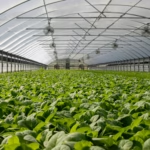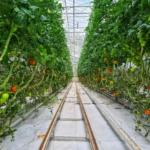
In recent years, sustainability has taken center stage in global food supply chains, and Africa is increasingly becoming a key player in that transformation. As concerns around climate change, environmental degradation, and ethical sourcing continue to grow, agricultural businesses are expected to do more than just deliver products—they must also ensure that those products are grown and transported in environmentally responsible ways. At the heart of this shift is sustainable agriculture, a practice that not only focuses on growing food responsibly but also considers the ecological impact of how those goods reach the world.
Ahar Group, a leading agri-exporter operating from Africa, has recognized the urgency of making its operations greener. The company has taken active steps to reduce its environmental footprint by adopting eco-friendly logistics and supporting sustainable agriculture from farm to export port.
The Need for Sustainable Agriculture and Green Logistics
Sustainable agriculture is more than a farming method—it’s a commitment to protecting the planet while ensuring long-term productivity. It includes using farming practices that maintain soil health, conserve water, protect biodiversity, and reduce dependency on chemical inputs. However, the supply chain doesn’t end at the farm. Agricultural products often travel thousands of kilometers to reach end consumers, and if that journey isn’t managed sustainably, it can significantly contribute to carbon emissions and waste.
That’s where green logistics comes in. It focuses on reducing the environmental impact of storage, packaging, transportation, and delivery. Combining sustainable agriculture with eco-friendly logistics ensures a truly green value chain—one that aligns with the expectations of today’s global buyers and environmentally conscious consumers.
How Ahar Integrates Sustainability at Every Stage
1. Sourcing from Sustainable Farms
Ahar begins its supply chain by working directly with farmers who practice sustainable agriculture. These farms are often trained or supported through Ahar’s network to use methods like crop rotation, organic inputs, and water conservation techniques. By starting with responsibly grown commodities, Ahar ensures that sustainability is embedded from the ground up.
2. Minimizing Packaging Waste
Traditional agricultural packaging often relies on plastic or non-recyclable materials that contribute to landfills and marine pollution. Ahar has moved toward using biodegradable and recyclable materials for packaging its exports. The group also explores bulk packaging solutions for larger shipments, minimizing the use of excess materials and reducing packaging waste.
3. Streamlining Transportation Routes
Transportation is one of the largest contributors to greenhouse gas emissions in the agri-export sector. Ahar strategically selects shipping routes and logistics partners that prioritize fuel efficiency and carbon reduction. In many cases, the company consolidates shipments to ensure that containers are filled to capacity, reducing the number of trips and optimizing transport efficiency.
4. Energy-Efficient Warehousing
Storage facilities, particularly those that require climate control, can be energy-intensive. Ahar has invested in energy-efficient technologies such as solar-powered warehouses and smart cooling systems that use less electricity while keeping products fresh. These warehouses are also designed to optimize natural airflow and reduce the need for artificial lighting and cooling.
5. Digital Tools for Supply Chain Transparency
Sustainability and transparency go hand in hand. Ahar uses digital tools to track the movement of goods, monitor supply chain emissions, and report on sustainability performance. These tools not only help reduce operational inefficiencies but also provide valuable data for future improvements.
This digital traceability also supports sustainable agriculture by ensuring that buyers can trace the origins of their products back to environmentally responsible farms.
Why It Matters for Global Buyers
Global buyers are under increasing pressure to source products that align with their own sustainability goals. Retailers and food brands are being scrutinized by consumers who want to know where their food comes from and whether it was produced and delivered ethically.
By working with exporters like Ahar that integrate sustainable agriculture and eco-friendly logistics, buyers can confidently claim that their supply chain reflects their environmental values. This not only improves brand reputation but also meets the regulatory requirements in markets where sustainability reporting is mandatory.
The Broader Impact on African Agriculture
Ahar’s approach also creates positive ripple effects throughout Africa’s agricultural landscape. When a company demands sustainable farming and responsible logistics, it sets a new standard in the market. Other farmers and exporters are encouraged to follow suit, creating a network effect that amplifies the benefits of sustainability across the industry.
Moreover, this model provides long-term economic benefits to African farmers. As global demand for sustainably grown products continues to rise, farmers engaged in sustainable agriculture can access premium markets and build more resilient businesses.
Challenges and Opportunities
Transitioning to sustainable logistics and farming practices is not without challenges. Many African farmers lack access to the training, technology, or capital needed to switch to sustainable methods. Similarly, developing green infrastructure for logistics—like energy-efficient ports or clean-fuel transportation—is still a work in progress in many regions.
However, the opportunities outweigh the hurdles. International development organizations, private investors, and governments are increasingly funding sustainable agriculture initiatives. With the right partnerships and incentives, companies like Ahar can scale up their efforts and help transform African agriculture into a global model of sustainability.
Ahar’s Commitment to a Greener Future
Ahar Group’s commitment to sustainable agriculture goes beyond marketing—it’s embedded in their business strategy. From empowering smallholder farmers to investing in renewable logistics solutions, Ahar is leading by example.
By adopting eco-friendly logistics and supporting regenerative practices, Ahar demonstrates that it is possible to deliver world-class agricultural products while preserving the environment. Their integrated approach proves that profit and purpose can coexist—and that Africa can play a central role in building a greener global food system.
Conclusion
The transition to sustainable agriculture and green logistics is not just a trend; it’s a necessity for the future of African exports. Companies like Ahar are showing that with vision, innovation, and responsibility, it’s possible to build a supply chain that benefits farmers, buyers, consumers, and the planet.
As more global buyers seek products backed by eco-friendly practices, Ahar’s leadership in sustainable agriculture positions it as a reliable, ethical, and forward-thinking partner in the world of agri-exports. This is the kind of leadership the global food system needs—smart, responsible, and rooted in a commitment to sustainability.











Add comment